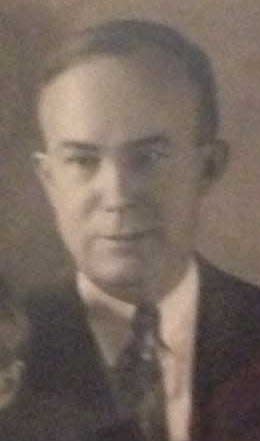Veterans column: Newark's Frederick Fleek Wright reports to boot camp during WWI
In the next few weeks, we will be looking at the lives of two veterans, Frederick Fleek Wright and his son, Frederick Wehrle Wright. The Wright family had been in Licking County since 1805 when Spencer Wright came from Granville, Massachusetts, with the first settlers that founded Granville, Ohio. Tracing the genealogy of the family from there presents a who’s who of familiar family names in Licking County such as Cooley, Fleek, Sherwood, and Hull, to name a few.
Frederick Fleek Wright was born on Oct. 7, 1886, to the president of the First National Bank in Newark, Frederick Sherwood Wright, and his wife of three years, Elizabeth “Lizzie” Gill-Wright. In 1898, the family, which now included two more children, purchased a home at the northwest corner of Hoover and Eddy Street. Frederick Fleek Wright followed in his father’s footsteps and went to work at the bank.
World War I began on July 28, 1914, and for almost three years, America managed to stay out of the war until, on April 4, 1917, America declared war on Germany. Frederick Fleek Wright had traveled to China and Japan in February 1917; after four months, according to an article in the Newark Advocate on June 4, 1917, he returned home. On June 5, the 30-year-old registered for the draft. He also applied for an Officers Training Camp. In August, he and eight other men from the county were accepted in the second Officers Training class and reported to Fort Benjamin Harrison.

While at camp, he received his personalized medallion from Licking County, which was sent to all its soldiers and sailors. He wrote a letter of thanks that was printed in the Advocate on Sept. 10:
“I wish to express my thanks for the very neatly designed medal you recently sent me and hope it will be very near the front when the Huns [Germans] are chased finally from invaded France and Belgium. Perhaps you may be interested in the development of the future officers that are being trained here at Ft. Benjamin Harrison. Unlike those of the first [officers training] camp, the men here now are much older, mostly from settled businesses or with past military experience. And they are very earnest in their drilling, studying, and learning. They do not sing much when they march, but you never hear a cross word, a complaint, or an excuse. We work hard, arising at 5:20, drilling, marching, and having physical exercise till 11:30. At 1:00, we resume but with lighter physical exercises, lectures on the parade ground or in the barracks on rainy days, and time for private business from 4:30 to 6, then supper time. We have study and conference from 7 till 9 and taps sound at 9:30. We have the luck to be in the brick barracks, with ample baths, good food, and a piano for diversion. The Newark contingent is doing well and stands in line for good commissions. My regards to you personally, Frederick F. Wright.”
Upon his graduation three months later in November, Frederick Fleek Wright received a commission as a 2nd lieutenant in the infantry. He reported to Camp Sherman in Chillicothe to join Co M of the 802nd Pioneer Regiment. The 802nd was an African American unit in the segregated army that was commanded by white officers. In September 1918, they sailed to France to add their contribution to the war to end all wars.
Doug Stout is the Local History Coordinator for the Licking County Library. You may contact him at 740-349-5571 or dstout@lickingcountylibrary.org. His book "Never Forgotten: The Stories of Licking County Veterans" is available for purchase at the library or online at bookbaby.com and Amazon.com.
This article originally appeared on Newark Advocate: Veterans column: Frederick Fleek Wright goes to boot camp during WWI
